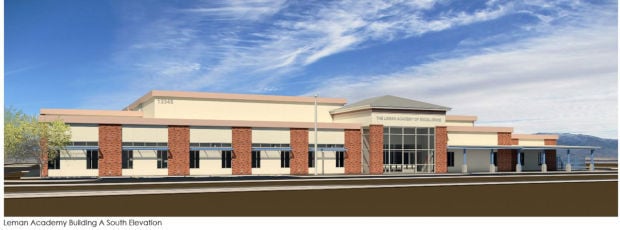Kevin Leman is best known as a successful author, psychologist and expert on relationships and families.
But the longtime Tucson resident is now diving headfirst into the education world, opening a charter school in Marana that he hopes will “make a dent in American education.”
The Leman Academy of Excellence will serve grades K-6 in its first year, adding seventh and eighth grades some time in the not too distant future, with possible plans to eventually open a high school.
Ultimately, Leman would like to see the Marana school become the model for a chain of schools across the country, saying there is a need in all communities for great schools.
Asked if he is qualified to open a school at a time when the focus on college and career readiness is at its peak, Leman responded, “I’m not qualified to do much” in a self-deprecating way.
He then explained that the philosophies he often talks about — respect, accountability, high expectations and fun — apply to running a successful school. When you couple those practices with a strong curriculum and highly effective teachers, Leman is hoping students will be better for it.
The standing-room-only crowds at recent information sessions about the school, which will open in August, indicates hundreds of parents are not bothered by his lack of education-related credentials.
Add to that the 500-plus students already enrolled in a school that can serve only 600 and it seems that families are buying what Leman is selling — a classical education most often offered in private schools.
The Leman Academy will not have much geographic competition because traditional charter school offerings in the Marana area are slim.
Legacy Traditional School’s northwest campus — less than four miles away — is a back-to-basics K-8 school. Leman said his school is founded on the principle that parents and staff members should work together to encourage students to pursue excellence.
The Open Doors Community School is about 12 miles away. The K-6 school serves rural, low-income youths in Marana. Open Doors has worked to cater to academic needs of students, but also their physical, social, emotional and economic needs, along with those of their families.
The classical model is based on a three-part process of training the mind. The early years are spent absorbing facts, laying the foundation for advanced study. The middle grades are where students learn to think through arguments, while during the high school years, students learn how to express themselves.
It also relies on children bringing their experiences and knowledge to the table, building off of that and filling in gaps. The model is high on student engagement rather than being teacher-centered.
Additionally, subjects are interrelated, so learning is not compartmentalized, allowing students to understand how one area applies to another.
While the model may be different from what is followed in traditional schools, the curriculum selected is aligned to Arizona standards now in place.
Megan Gilbertson of the Arizona Charter School Association was unable to say whether the Leman approach to education is rare here, because it does not track educational models.
DeAnna Rowe, executive director of the Arizona State Board for Charter Schools, also could not say whether it was unique.
In addition to implementing the classical model, Leman’s work on birth order, for which he is well-known, will find its way into classrooms as students will be seated accordingly — pairing first-born leaders with babies of the family who often need more direction.
Leman hopes to turn traditional recess time into enrichment, having children work in gardens or playing with educational equipment rather than using swings and slides.
While Leman is working to make the school accessible to all, with plans to serve special-education students, the charter school will not provide transportation.
It will offer both half- and full-day kindergarten, but the latter is fee-based.
As interest forms flood the school, Leman’s focus is on ensuring that the academy hires the highest quality teachers, whom he hopes to pay more than what they might receive in a traditional public or private school if the budget allows. Those teachers, Leman said, will greet children at the curb, even on a 100-degree day in August, to let students know they are happy to be there.
It was one caring educator who made the difference in Leman’s life, as he recounts being the “ultimate screw-off,” graduating at the bottom of his high school class and being kicked out of college.
“It was a teacher who pulled me aside when I was 17 years old, a senior in high school,” said Leman, who recalled questioning what was next for him while his peers prepared to ship off to college.
“She pulled me aside and said, ‘Do you think you could ever use those skills you have for something positive in life?’ And that was the first time that a teacher ever said to me that I had skills, so I’ve grown to appreciate a good teacher,” he said.
A good teacher for Leman is one with a heart, teachers with experience who are willing to challenge students to bring out the best in them. Whether they are certified is less important to Leman.
“I look at ourselves educationally, and it seems we water down about everything there is to water down,” Leman said. “Easy B’s are all over the place in education. I don’t think we expect enough of kids, and I think we want to be a school that has high expectations for kids peppered with encouragement that says, ‘You can do this.’
“I’m of the opinion that kids will move to the expectation you give them.”
Leman, who identifies himself as a “teacher at heart,” won’t be just lending his name to the school. He plans to lead parenting workshops for Leman Academy families as well as in-service for teachers, which he has done across the country for years.





